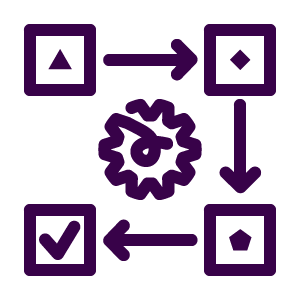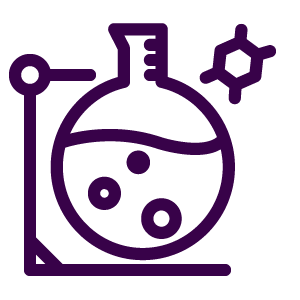As concerns about climate change, biodiversity loss, water and plastics pollution continue to grow, stakeholders are calling on pharmaceutical companies to take action to address their impacts.
We understand pharmaceutical industry challenges
With every challenge comes opportunity. We understand the need to continue providing the best treatments to patients while prioritizing environmental sustainability and resiliency in the supply chain. The industry has an opportunity to transform the status quo by addressing these challenges across the value chain and align business within planetary boundaries.

The levers for sustainable transformation are many, and now is the time to act.

Circular economy
The pharma industry relies heavily on various resources and materials, such as chemicals, water and packaging materials that contribute to pollution. Companies need to adopt circular economy practices both in their manufacturing processes and throughout their product life cycles to reduce resource consumption, emissions and waste.

Biodiversity loss
Pharmaceutical companies depend significantly on natural resources for new drug development and production. To drive sustainable transformation, companies need to ensure that their activities don’t contribute to biodiversity loss and ecosystem degradation.

Supply chain management
The vulnerabilities of global pharmaceutical supply chains highlight the need for companies to build supply chain resilience and adopt sustainable practices to reduce the impact of their operations on the environment and affected communities.

Climate change
As one of the biggest contributors to greenhouse gas emissions in the healthcare sector, pharma companies need to adopt ambitious strategies to reduce not only their own carbon footprint, but also indirect emissions from suppliers.

Engaging stakeholders
The use phase of medicine is critical for healthcare. Companies must engage with downstream stakeholders to ensure the optimal impact of upstream actions to reduce their environmental impact.

Ecodesign
Product development is long, costly and requires certain procedures. At the same time, pharma companies rely mostly on innovation to provide the best medicines to patients. Utilizing ecodesign practices, the industry can reduce the environmental impact of its products.

Digital transformation
As the pharma and healthcare industry embraces sustainable practices along the value chain, requirements for reliable data and transparency are rapidly increasing. Key players need to develop and integrate technology solutions that will help measure, track and report sustainability performance at scale. Managing data flows is becoming pivotal to ensure seamless integration and ethical practices.
Key topics for the industry
As the healthcare industry expands, expectations for transparency and environmental responsibility are growing among patients and health authorities alike. The pharmaceutical industry is not only highly dependent on natural ecosystems — it also significantly impacts them, which presents considerable challenges. From integrating ecotoxicity into product development to developing nature-based strategies, Quantis has identified four key trends set to shape the industry in 2025.
How Quantis can help
For nearly two decades, Quantis has supported the Food and Beverage Industry on its journey towards sustainable transformation. We partner with stakeholders across the value chain — from brands and processors to farms and trade bodies to retailers, associations and institutions — and engage in pre-competitive initiatives to assess impacts, plan sustainability pathways and transform the industry as a whole.
We strongly believe, by working together, a sustainable food system is mission possible.
We guide companies on the transition from business as usual to business at its best.
Quantis pharmaceuticals experts can help you to:
-
Develop integrated, science-driven strategies and roadmaps that go beyond climate
Companies working solely on carbon miss out on major opportunities to make real progress on their sustainability strategies. We work with clients to set ambitious actions on biodiversity, water, land-use change, plastics and ecotoxicity to avoid impact transfer and align business with planetary boundaries.
-
Accelerate and institutionalize sustainable innovation
By collaborating with clients to integrate ecodesign into their products and packaging, we help meet growing consumer demand for greater transparency around the environmental impacts of products.
-
Activate and transform supply chains
We work to focus efforts and resources on addressing the most relevant impacts and making meaningful strides towards the larger strategy.
We’re your full-service partner for the transformational journey. Our strategic advisors are equipped to guide you at every point along the way.
Quantis experts
Latest case studies
Building the foundation for sustainable pharma with the Pharma LCA Consortium and BSI
The LCA consortium, aiming at supporting the technical use of the standard by LCA members, has developed also a Guidance Document with the support of Quantis.Angelini Industries
Discover how a century-old, family-owned company is embedding sustainability, safety and resilience at the heart of its purpose — partnering with BCG and Quantis to…Pharma Company
Quantis supported a global pharmaceuticals company in understanding its impacts and dependencies on nature, assessing the related risks and opportunities, and evaluating…
Latest insights
Beyond carbon: Embedding nature risks across the pharma value chain
Why pharma must tackle its hidden dependence on nature to safeguard patients, secure supply chains and build long-term resilience.What nature-related risks does the pharma industry face?
Clement Turnier explores the connection between pharmaceuticals and nature, outlining key environmental risks.Navigating sustainability challenges in the pharmaceutical industry in 2025
From environmental transparency to biodiversity preservation, Quantis experts share four key strategies to align the pharmaceutical sector with planetary boundaries.










